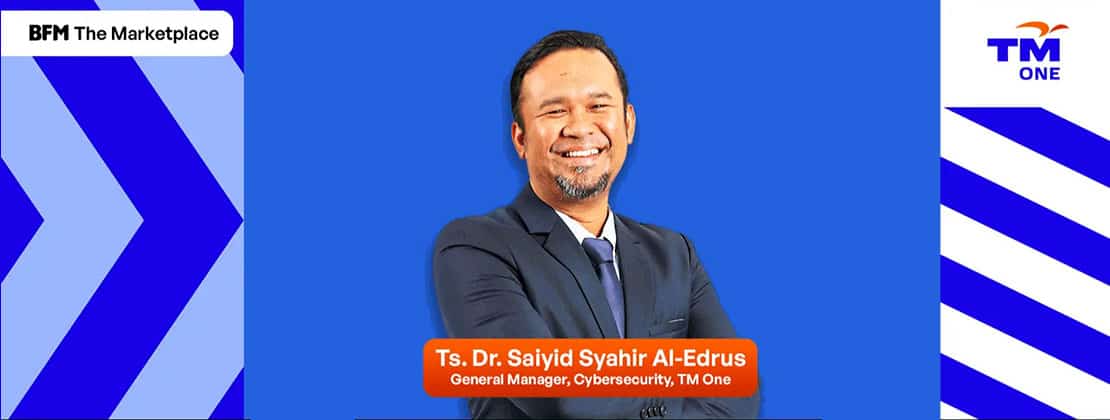
Powered by TM One α Edge is organized by Huawei in collaboration with Malaysia Digital Economy Corporation (MDEC) and TusStar (Malaysia), The Huawei Spark Program competition was launched in November 2020. This hybrid accelerator program hopes to supercharge startup growth within the deep-tech segment by providing crucial resources and business development opportunities. The winners will receive access to TM One α Edge cloud platform, business matching opportunities, networking sessions, and one-on-one mentoring from industry experts.
Through this competition, TM One hopes to help start-ups build greater capabilities with cloud technology in helping them achieve business resiliency and scalability. We aim to increase cloud adoption by startups, which currently contributes to 26% of the Malaysian cloud market according to GLG Consulting. As a fully integrated digital enabler, this event strongly supports our vision to further develop Malaysia into a digital-first nation.
In part one of our Tech Competition series, the stories below showcase the 10th to 4th place winners (excluding the top 3 winners) and the respective solutions that were pitched. The 10 winners were chosen among 140 entries that participated in the competition.
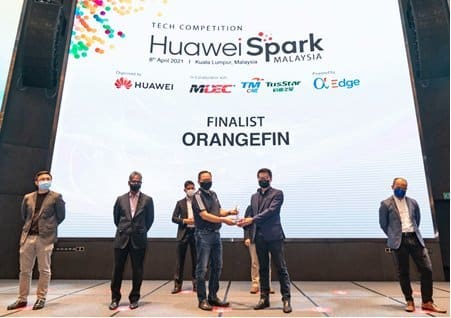
OrangeFIN Asia equips companies with a highly accessible and sustainable approach to adopt Robotic Process Automation (RPA). Using software bots, RPA offers value by automating business processes based on specific sets of business logic. With its flagship product OrangeWorkforce, OrangeFIN allows companies to deploy these bots at a personalised level with specific solutions catered to the needs of their clients. Applications include accounting automation, sales process automation, regulatory reporting, and data quality assurance.
Driven by Artificial Intelligence (AI), their bots come equipped with a peer-monitoring ability that identifies glitches and acts by triggering self-recovery. Having this capability ensures that the bots are self-sustained and require minimal monitoring. The use of AI adds value by arming the bots with cognitive abilities to handle higher-order tasks.
In the banking sector, OrangeFIN has been successful for one of the top Malaysian banks in automating its Cheque Clearing Process to clear an average of 135,000 cheques every day. OrangeFIN is also a technology solution provider within UOB Jom Transform Program. It aims to digitalise local SME operations to increase productivity and revenue. Notably, its efforts also gained nationwide recognition, achieving the Malaysia Technology Excellence Award in 2020 within the Robotics and IT services segment.
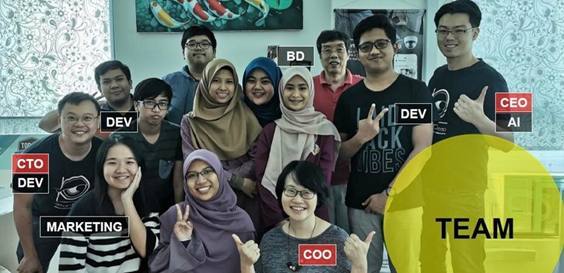
SmartPeep offers smart-care technology solutions to upgrade elderly patient care. Their founder, Lim Meng Hui developed these features after witnessing the injury of a family elder who fell and did not recover from the consequent trauma. Understanding the pain points of both the seniors and the caregivers, SmartPeep developed an AI-powered surveillance technology solution. Its mission is to assist caregivers in providing effective elderly care with AI.
The main product, SmartPeep AI Elderly-Sitter System, is a smart assistant for caregivers to detect and prevent potential accidents. For example, the system can detect a patient trying to get out of bed that may cause them to fall. It would then instantly alert the caregiver to attend to the patient proactively. Other situations include when patients are wandering around alone, away from the bed at odd hours, or in the toilet for an extended time. This offering significantly improves the caregivers’ ability to monitor patients and provide just-in-time assistance to prevent any accidents from occurring.
The SmartPeep AI solution has shown to be effective, with adopters reporting over 50% reduction of in-patient falls and over 60% faster response time from nurses. The World Health Organization reported fall-related incidents as one of the major causes of premature death. Hence, SmartPeep is proving to be the crucial foresight for caregivers in preventing such incidents and ensuring the best care and safety for their elderly patients.
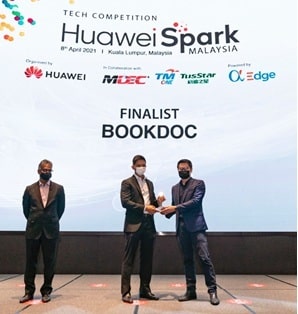
Founded by two healthcare and e-commerce space leaders, BookDoc is a telehealth platform that aims to connect healthcare providers to patients conveniently. Its end-to-end telehealth solution comprises 40,000 healthcare professionals serving 900,000 users across five APAC countries. In collaboration with Google Maps, Uber, and Agoda, BookDoc is fortifying the medical tourism industry while proving to be a key technology enabler for local health programs.
Being a one-stop digital healthcare platform, BookDoc offers a range of services to reduce overall healthcare costs for consumers and corporates. The telemedicine ecosystem includes AI-integrated tele-consulting and chatbot services that allow patients to access healthcare remotely. BookDoc also offers next-gen healthcare services, such as IoT-integrated wellness programs, virtual clinics, a health-focused e-shop, and commercial data analytics. The Ministry of Health (MoH) onboarded the BookDoc telehealth platform as its official partner for healthcare initiatives. This collaboration sees them offering the latest updates on the virus whilst enabling on-demand COVID-19 tests and virtual consultation from government clinics. Alongside industry partners such as the Ministry of Education and Petronas, BookDoc achieved global recognition for its innovative healthcare solutions, including spots on the CNBC Upstart 100 List and the ASEAN Business Awards in 2019.
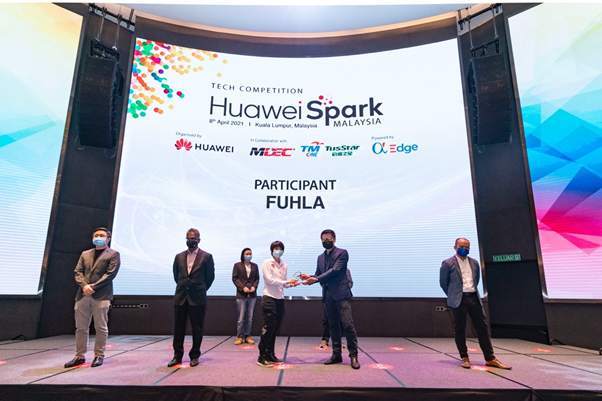
The mobile applications market has seen rapid developments across many categories, and this abundance has created a choice overload for consumers. Consequently, this has negatively reduced the visibility of newer developments in the market. To tackle this problem, YouthsToday.com developed Fuhla, an app-experience-enrichment service provider that aims to empower technology-based companies with faster go-to-market abilities. This platform enables users to browse and discover new applications that currently lack visibility on the mainstream digital marketplaces. As an added value, it allows app advertisers to share marketing costs and reach a clear target market. Notable successes include applications such as Raiz and Touch N Go eWallet that were initially listed on Fuhla to build a foundational user community.
Fuhla uses deep learning AI capabilities to profile users in their app tester community served by a proprietary app recommendation algorithm. They collect multipoint behavioural and location data for their machine learning capabilities. To ensure top-level security over personal and financial data, Fuhla uses a secured server hosted by SWREG. Additionally, with data analytics functions built into dashboard report features, early app developers (those with less than 10,000 downloads) can access valuable insights and obtain direct UX feedback from the Fuhla community.

Although it was in its nascent stage within the tourism industry, Fonebud IoT Berhad unveiled its Mobile Sharing Assistant (MSA) device at Consumer Electronics Show 2019. Developed as a perfect companion to business travellers, the MSA operates as a portable handheld WIFI hotspot with language translation and device-charging features, among others. MSA harnesses its unique sharing cross-border rental system. Its devices are available at retail outlets and vending machines to provide data to travellers across the Asian region. MSA helps travellers save costs and tackles concerns with foreign language communication and mobile device connectivity.
Being an integrated IoT device, the MSA uses eSIM technology and its extensive collaboration with telecom operators to offer international data roaming services. The hotspot feature supports 21 bands of 4G LTE in over 120 traveller-friendly countries, giving travelers on-the-go connectivity. Advanced AI and NMT (Neural Machine Translation) technology form the core to the state-of-the-art language translation feature. The MSA instantaneously recognises and translates conversational semantics in its unique push-to-talk dialogue feature. Additionally, this ‘Good Design Award’ winner also aims to revolutionise pocket travel guides, as it offers image translation abilities to help as an AI tour guide.
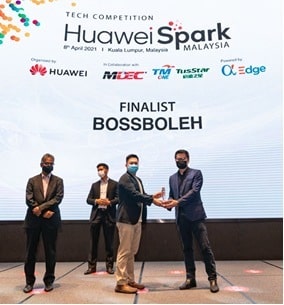
Boss Boleh is a start-up that plans to disrupt the traditional company secretarial (CoSec) services landscape with a modern approach. Billy Lee, founder and CTO, developed the company after discovering the heavy secretarial expenses incurred by start-ups. Its solutions include affordable tiered packages and flexible on-demand secretarial services that cater to growing Malaysian companies.
Driven by cloud technology, Boss Boleh operates on a multi-tenant SaaS system design. The said multi-tenant design allows a wide range of integrated secretarial solutions (including advisory, tracking, and reporting) to be available on a single platform. Users have 24/7 access to statutory documents, cloud applications and storage, digital signature verification, and startup mentorship. With its end-to-end solution, Boss Boleh intends to replace in-house company secretaries, which will significantly reduce secretarial costs and compliance complexities for small companies.
Its smart services use several key digitisation technologies – cloud architecture, workflow automation, AI-enabled chatbots, e-KYC for on boarding, RPA, and accounting integration, to meet the evolving regulatory requirements. As validation of its industry value and innovation, Boss Boleh has won multiple awards, including MyHACKATHON 2020 and was among the Top 10 in the ASEAN Start-ups competition in 2021.
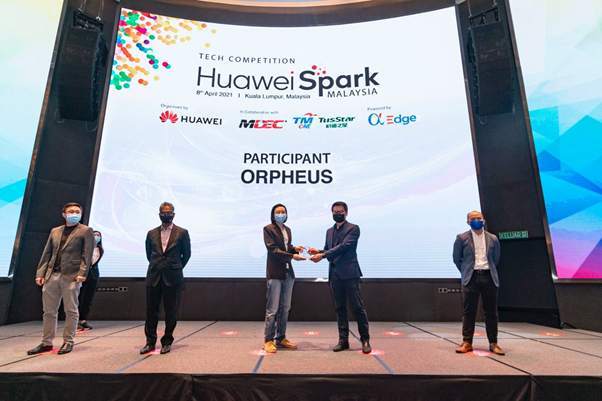
As businesses continue to struggle during the pandemic, one of the key pain points is the need for adequate cash flow to continue operations. Orpheus Capital aims to support the underserved community within the SME segment by providing fully digital seamless financing solutions. Positioning itself as a fully digital Shariah-compliant supply chain financing company, it provides services ranging from invoice financing, contract financing, and payday financing.
Orpheus Capital has a purely digital application process for its financing solutions, done through its website. Customers only need to upload several invoice documents and are eligible to receive their funds within 48 hours. An advanced AI system runs the entire workflow, which includes a unique risk scoring system, automated debt collection and contract signing, as well as a tool for fraud mitigation. These technologies allow Orpheus Capital to differentiate itself by providing fast, simple, and secure financing solutions for SMEs.
The average life span of an S&P 500 company has decreased from 60 years in the 1950s to under 20 years currently. This statistic indicates the disruptive nature of technology in shifting the nature of businesses. Hence, it is imperative for companies to understand the pivotal technologies that are driving these solutions. From large companies to small companies, the adoption of these technologies is key to building future-proof business models.
At TM One, we believe that providing strong infrastructure support for solution providers will help them scale their technology with speed and security. This support includes allowing companies to expand their business capacity with a reliable, cost-efficient IT infrastructure. Hence, with the support of TM One’s α Edge Cloud platform, we strive to work together towards crafting a more profound, digital future for Malaysia.